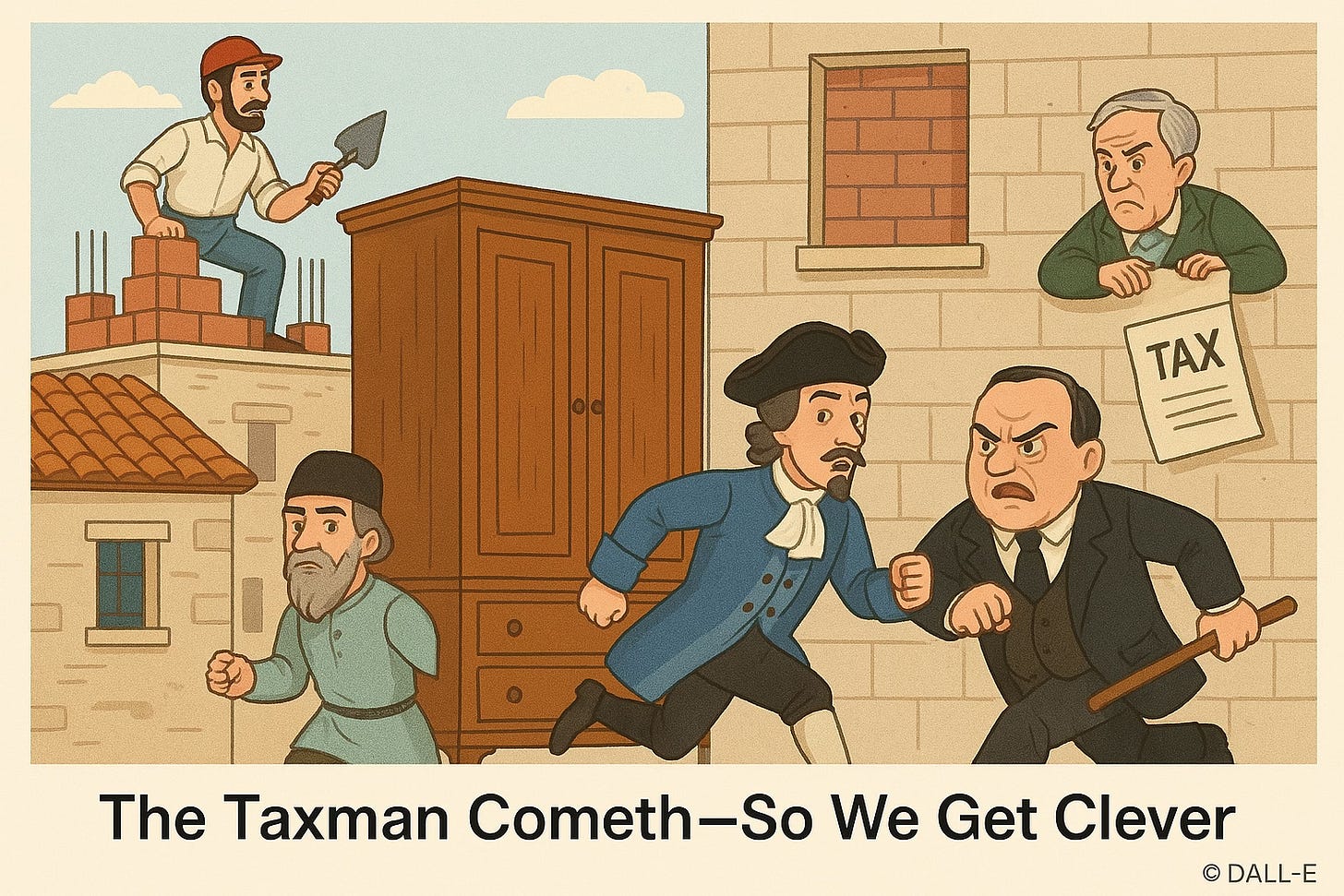From the THX Series Hub: Government That Works
Micro-Histories of Tax Dodging, Human Ingenuity & What They Reveal About Us
Italy – The Phantom Floors
In southern Italy, taxes were historically based on the number of finished floors in a home. So families left their top floors unfinished—rebar sticking out of cement, bricks exposed—perpetually “under construction.” This wasn’t laziness or poverty. It was strategy. As long as the building was incomplete, it wasn't taxed.
Micro-moment: What looks like decay was actually defiance wrapped in fiscal logic.
England – Closet Evasion
In 17th-18th century England, homes were taxed based on the number of rooms, and “closets” counted as rooms. In response, people began using armoires and bureaus instead of built-in closets. That’s why American homes (influenced by English design) didn’t commonly have closets until much later.
Admiration Equation: Admiration of ingenuity. Skill in navigating—and outwitting—systems.
France – The Window Tax
Under Louis XIV and later, homes were taxed per window. The result? Bricked-up windows across French cities. Less light, worse air—but lower taxes. This had health consequences, particularly for the poor.
Prospect Theory: The perceived loss (paying more taxes) outweighed the actual loss (light and health), especially when compared to the already heavy burden of other living costs.
Russia – Beard Tax
In the late 1600s, Tsar Peter the Great wanted to modernize Russian society and modeled reforms after clean-shaven Western Europeans. He imposed a tax on beards. Many men paid up rather than shave—wearing medallions to show they’d paid the fee.
PERMAH Insight: Identity and tradition (meaning, pride, engagement) trumped monetary loss for many men.
United States – Hat and Horse Taxes
In the 18th and 19th centuries, luxury items like hats and carriages were taxed. This led to patterns like shared ownership, false registration of horses and carts, and even exaggerated wear-and-tear to reduce value estimates.
Utility Lens: Value & Resource – People optimized their financial resources while still participating in symbols of status.
Greece – Swimming Pools & Google Earth
Modern Greece’s wealthiest citizens were famously evasive on taxes. One method was not declaring luxury property features like pools. In 2009, the government used satellite images to compare declared pools (324) vs. visible pools from Google Earth (16,974).
Modern Admiration Equation Twist: When tech meets accountability. Admire the counter-counterstrategy?
Reflection: What All This Reveals
These stories aren’t just amusing—they show our deep psychological calculus about fairness, loss, and ingenuity.
Using Prospect Theory, we see that avoiding loss (paying tax) often motivates far more action than gaining something (improved public infrastructure). People will forego health, comfort, or even light to avoid perceived unfair burdens.
Using PERMAH, we can see how emotional wellbeing (meaning, identity, autonomy) shapes how people interpret what's worth paying for. When taxes feel like theft instead of shared contribution, it breaks trust and diminishes collective purpose.
And under the Admiration Equation, we realize: we admire cleverness—even when it bends rules. We love the rogue. But admiration can shift when cleverness becomes hoarding, and when trickery robs the commons.
Engagement CTA:
What would you have done in one of these situations? Would you brick your window, hide your closet, or shave your beard?
And what does your reaction reveal about your relationship with fairness, identity, and freedom?

Interpretation:
This image brings to life the timeless dance between regulation and resistance. Across cultures and centuries, people have resisted taxes not simply out of greed but as expressions of autonomy, defiance, and adaptation. Every clever trick—whether architectural, sartorial, or symbolic—represents a micro-moment where people asserted their values against imposed systems. When viewed through the THX lens, these acts reveal emotional truths: loss aversion, meaning-making, and the desire to feel resourceful in the face of authority.
The bigger question it invites: When do rules inspire ingenuity—and when do they crush the spirit they’re meant to uplift?



